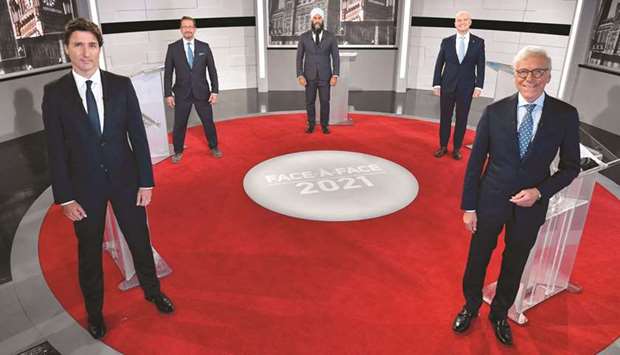Canadian Prime Minister Justin Trudeau came out onto a debate stage on Thursday with guns blazing, needing to turn around his Liberals’ faltering re-election campaign.
The French-language dust-up hosted by broadcaster TVA is the first of several leaders’ debates ahead of the September 20 ballot.
It saw the one-time golden boy of Canadian politics square off against his principal rival, rookie Conservative leader Erin O’Toole, whom he now trails in public opinion polls, as well as New Democratic Party leader Jagmeet Singh and Yves-Francois Blanchet at the reins of the separatist Bloc Quebecois.
They sparred over mandatory coronavirus (Covid-19) vaccines, child care, taxation and the economy, oil and climate change, gun violence, the #MeToo movement, and racism.
“You do not know the issues, Mr O’Toole!” Trudeau said. “You have not costed any of your policy proposals. It is not a serious plan.”
He also accused the frontrunner of supporting “two-tier” private and public health care, which a majority of Canadians reject.
Alternately, Trudeau found himself on the back foot for having called the snap election only 18 months after the last general election, which the prime minister defended by saying a new mandate was needed to steer the nation out of the pandemic.
“We must give Canadians the choice,” he shot back at challengers.
In the first two weeks of the campaign, Trudeau stumbled as the leftist New Democrats siphoned off voter support from his Liberals, allowing the Tories to slip into the lead despite making few inroads themselves.
Blanchet, meanwhile, is wildly popular in Quebec province, and is looking to block Liberal gains sought in the key election battleground.
In 2019, a resurgent Bloc tripled its seat count in fickle Quebec, helping to prevent the Liberals from hanging onto their majority.
Quebec accounts for 78 of the 338 seats in the House of Commons and is deemed crucial for any party seeking office.
“Since the start of the campaign, things have not gone very well for Justin Trudeau’s Liberals,” Daniel Beland, a politics professor at McGill University in Montreal, told AFP.
The Liberals, which called the election while high in the polls, hoping to regain a majority in the House of Commons, have “faced a stronger Conservative opposition than they expected”, he said.
Widespread voter apathy is also a challenge for the incumbent.
Few wanted an election now, when Canadians are just starting to emerge from pandemic lockdowns of the past year to return to the office and send their kids back to school.
“We can work to do big things during a pandemic but we need a clear mandate ... to understand what Canadians want for the next years,” Trudeau said.
“This is not the time for an election, during a pandemic,” O’Toole retorted, accusing Trudeau of “putting his own interests ahead of Canadians’ interests”.
The other two leaders also piled on with similar rebukes, saying that Trudeau instead should have been managing rising Covid-19 case numbers and evacuations from Afghanistan in the wake of a sudden Taliban takeover.
At several campaign stops, Trudeau has been met with bitter protests.
One event last Friday had to be cancelled as an angry mob opposed to mandatory Covid-19 vaccines risked overwhelming the prime minister’s protective detail.
An unexpected economic contraction after nine months of strong growth also cast a pall over the campaign.
Beland opined that Trudeau rightly “came out fighting, and defended himself well” in the debate.
O’Toole also “did well”, he said.
After six years of Liberal rule, the Tory leader presented himself to the nation as the face of “change” and fiscal restraint after the Liberals ran up massive deficits to help households and businesses weather the pandemic.
“At the moment, we cannot rule out the possibility that O’Toole could be elected to head a minority Conservative government,” said Frederic Boily, a politics professor at the University of Alberta.
Two more nationally-televised leaders debates, one in French and one in English, are scheduled for September 8 and 9.

Trudeau (left), Blanchet (second left), Singh (centre), O’Toole (2R) and Canadian journalist Pierre Bruneau (right) pose for the official photo at the TVA studios ahead of the Face-a-Face 2021 debate in Montreal on Thursday evening.
